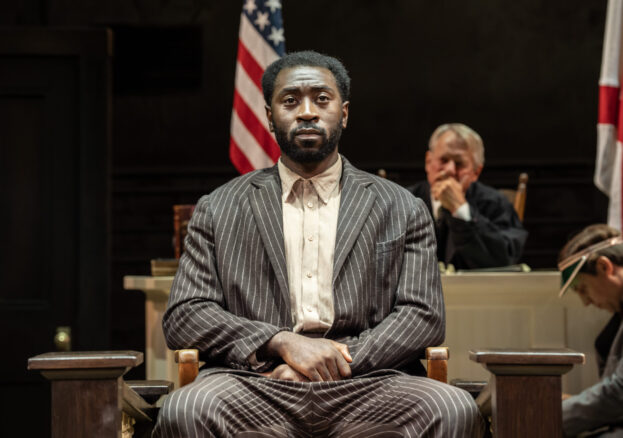
As someone who has participated in scriptwriting and acting on stage – the staging is such a significant part of theatre, yet arguably one of the most overlooked. What I enjoyed about To Kill a Mockingbird’s staging was that it was constantly changing and cyclical, which may sound messy but it was the closest staging to flipping the pages of a book. The chaoticness of changing scenarios, yet the smoothness of it mirrored finding hope amongst messiness. Additionally, the repetition of locations until the denouement symbolised how we always have to go back and forth until we learn from our lessons.
Narration
Initially, the jumps between the past and present narrated by Dill Harris, Scout and Jem Finch were confusing. Nonetheless, their significant insight acted as the glue of the play as it added a sense of chronology and context for the events that shaped the drama. Secondly, the comedic timing added another shade of realism – the innocence of children, no matter how involved or intelligent they are in serious matters. Not only did I grow close to other characters due to the narration, but they also smartly enabled me to realise the key purpose of the play: hierarchies within the white race. This is what stood out to me the most as usually when tackling racism, the white perspective is dominant while the black perspective is homogenous. Nonetheless, this showed the diversity within the white community which was constantly reinforced: the white traitors who were culturally aware, the racists, and etcetera.
White perspective
Within the hierarchy the top section of the “good” white race was portrayed by a variety of categories. Firstly, Atticus Finch symbolises the double-edged nature of being dedicated to being morally, religiously and legally on the right side of history. On one hand, he is admirable due to his forward thinking in a period of immense backwardness, which is even more impressive when you consider that he is a white lawyer. However, Finch’s inability to recognise that these commendable traits are just an example of his privilege exposes the limits in scope of white understanding of black sufferings. Secondly, Jem Finch enacts a more active and overt approach in ensuring that his stance on racism and anachronic attitudes – which is constantly condemned by his father revealing a key generational difference within the white community during the early 20th century. In the theatre there were myriads of generations, therefore this difference in attitudes within the same category I believe would relate to many people and help us understand each other.
On the contrary, the lower “bad” half of the hierarchy contains the adverse racists. Bob Ewell’s use of aggression and racism whenever proven wrong or vulnerable was scarily relatable to witness especially when looking at racism today. This revelation that despite the play being based (and written) a century ago it is still relevant made the production even more powerful as the message of the play still stands. However, what stood out about Ewell, was that ironically, despite using racist slurs most of his anger was directed to Atticus for being a “white traitor”. This intense hatred with no direction and means, really made me realise the paradox of racists being a minority parallel to ethnic groups. Secondly, and in my opinion the most complex character, Mayella Ewell was perplexing. The fact that she potentially feared being labelled a “white traitor” more than locking up her actual abuser just enforced how dangerous conformity is. Even though she is successfully indulged by this fear, I just couldn’t help but fail to understand what her aim was or what she hoped to achieve. This part of the production, gets you thinking not only throughout the play, but also afterwards. Additionally, I believe it sheds light on the fact that not everyone can be understood.
Conclusion
It was a truly mind-tingling and honing play to watch – every single piece of staging and acting was truly top quality. It is a production which gets you thinking and a play which I am positive we can all relate to and learn from in the 21st century.
Listings
To Kill A Mockingbird
8 September – 4 October 2025
Venue: Quarry Theatre, Leeds Playhouse
Tickets: £16.50 – £65.00
Running Time: 2 hrs 50 mins (including interval)
Age Guidance: 12+
️ Book now: Leeds Playhouse – To Kill a Mockingbird
